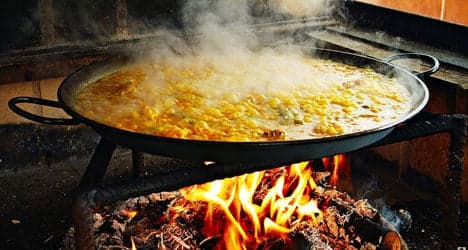'Wikipaella' declares war on 'crimes against rice'

An online 'paella police' platform known as 'Wikipaella' has stepped up its campaign to stop the culinary 'prostitution' and 'crimes against rice' that they claim are commonly perpetuated against Valencia's most famous dish.
It is a common sight in tourist areas around Spain: plates of recently defrosted, artificially-bright yellow rice, served direct from the microwave to unsuspecting visitors as 'authentic paella'.
The true Valencian paella is in danger of being lost in this sea of cheap imitations, according to a group called Wikipaella who have sprung up to defend the region's defining dish.
They want to hammer home the message that while all paellas are rice dishes, not all rice dishes are paella.
For them, a true paella respects its local roots and uses only 'Km0' ingredients, such as snails, rabbit, green beans and bomba rice from the nearby Ebro Delta.
The yellow tint should come from saffron, not food colouring.
Like most Valencians, they accept that there are variations within the region, including the ubiquitous seafood paella.
But they reject the "prostitution" of the dish that regularly occurs beyond its borders.
Celebrity chefs in the UK and US seem obsessed with adding chorizo to their own 'real Spanish' paellas, while Wikipaella members recoil in horror from tales of avocado-laden Mexican versions.
Even close to home, discerning diners are not truly safe; there have been reports of poached eggs plopped onto paellas in Valencia itself.
Founding members Guillermo Navarro, Paco Alonso and José Maza have taken it upon themselves to police the plates that purport to be paella.
Speaking to local daily Levante-EMV they explained that they want to "create tools to help people participate in an active way".
On their website, the paella-curious can ask questions about authenticity and restaurants can apply to be certified as serving genuinely authentic Valencian paella.
They want to praise those who make the dish correctly, and name-and-shame the guilty.
"Wikipaella is independent because we aren't dependent on institutions, organizations, religions or anything and it's the criteria of our users that counts," said Navarro.
To get a stamp of approval from Wikipaella, chefs must commit to its manifesto which concludes with a promise to "carry paella in our hearts, and travel with it as far as we can".
Don't miss stories about Spain, join The Local on Facebook and Twitter.
Comments
See Also
It is a common sight in tourist areas around Spain: plates of recently defrosted, artificially-bright yellow rice, served direct from the microwave to unsuspecting visitors as 'authentic paella'.
The true Valencian paella is in danger of being lost in this sea of cheap imitations, according to a group called Wikipaella who have sprung up to defend the region's defining dish.
They want to hammer home the message that while all paellas are rice dishes, not all rice dishes are paella.
For them, a true paella respects its local roots and uses only 'Km0' ingredients, such as snails, rabbit, green beans and bomba rice from the nearby Ebro Delta.
The yellow tint should come from saffron, not food colouring.
Like most Valencians, they accept that there are variations within the region, including the ubiquitous seafood paella.
But they reject the "prostitution" of the dish that regularly occurs beyond its borders.
Celebrity chefs in the UK and US seem obsessed with adding chorizo to their own 'real Spanish' paellas, while Wikipaella members recoil in horror from tales of avocado-laden Mexican versions.
Even close to home, discerning diners are not truly safe; there have been reports of poached eggs plopped onto paellas in Valencia itself.
Founding members Guillermo Navarro, Paco Alonso and José Maza have taken it upon themselves to police the plates that purport to be paella.
Speaking to local daily Levante-EMV they explained that they want to "create tools to help people participate in an active way".
On their website, the paella-curious can ask questions about authenticity and restaurants can apply to be certified as serving genuinely authentic Valencian paella.
They want to praise those who make the dish correctly, and name-and-shame the guilty.
"Wikipaella is independent because we aren't dependent on institutions, organizations, religions or anything and it's the criteria of our users that counts," said Navarro.
To get a stamp of approval from Wikipaella, chefs must commit to its manifesto which concludes with a promise to "carry paella in our hearts, and travel with it as far as we can".
Don't miss stories about Spain, join The Local on Facebook and Twitter.
Join the conversation in our comments section below. Share your own views and experience and if you have a question or suggestion for our journalists then email us at [email protected].
Please keep comments civil, constructive and on topic – and make sure to read our terms of use before getting involved.
Please log in here to leave a comment.